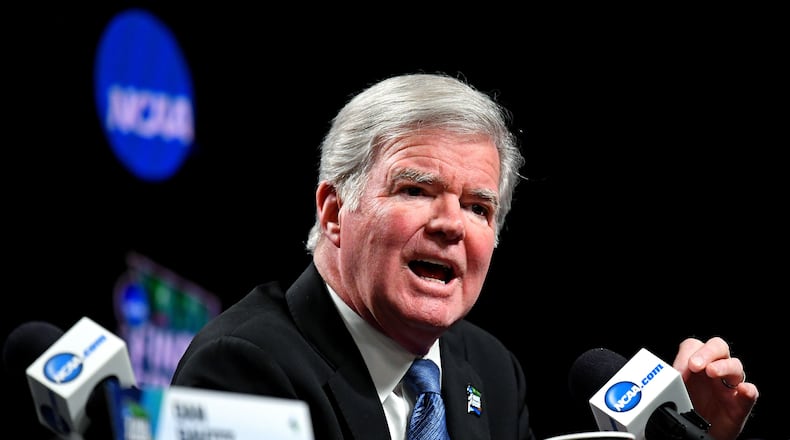The NCAA didn’t cave Tuesday. It barely blinked. I’m all for ending the NCAA’s exploitative “amateur” model, but this development won’t do anything to hasten its demise.
The NCAA Board of Governors voted to allow athletes to "benefit" from the use of their name, image and likeness (NIL) "in a manner consistent with the collegiate model." Those words are the giveaway that the NCAA is trying to create the illusion that it is changing its system to the benefit of athletes without really doing it.
A “benefit” doesn’t necessarily mean cash and the “collegiate model” is one in which schools collude to prevent athletes from earning their market value. The details about the new guidelines contained in the NCAA news release confirm that the changes are cosmetic. They are meant to insulate the NCAA from the growing public, political and legal pressure while maintaining the status quo.
The NCAA said its member schools should “consider” changing NIL rules, but that athletes are to be “treated similarly to non-athlete students unless a compelling reason exists to differentiate.” NIL rules should make clear “the distinction between collegiate and professional opportunities” and that “compensation for athletics performance or participation is impermissible.” They should “prohibit inducements to select, remain at, or transfer to a specific institution.”
These provisions severely limit the market for athletes’ NIL rights, which is the point. The NCAA is only pretending to respond to criticism and threats from lawmakers by giving athletes more rights. Really, it is making superficial changes while guarding against its existential fear: basketball and football athletes eventually receiving a fair share of the billions in revenue they generate for schools.
Under the NCAA’s model, only coaches and administrators can seek compensation in a free market. Schools collude to prevent athletes from doing the same (with a telling exception, which I’ll get to later). The NCAA and its media partners use the NIL of athletes to relentlessly promote schools, games and conferences while prohibiting athletes from profiting from their own NIL.
The courts and lawmakers have allowed this to go on for decades. NCAA schools got too greedy in recent years and people started to notice that players are commercialized in every way except being paid. The shift in public attitudes contributed to California passing an NIL law Sept. 30.
Soon, Florida governor Ron DeSantis endorsed a bipartisan NIL proposal. A committee in the Illinois House sent a NIL measure to the floor. Georgia state Rep. Billy Mitchell (D-Stone Mountain) announced his intention to introduce a NIL bill in the Georgia General Assembly. There are NIL proposals pending in South Carolina, Minnesota and New York.
This was a predictable outcome. Politicians can get an easy win by protecting State U.'s ability to recruit on a level playing field. The NCAA's concerns that this will lead to competitive imbalance are insincere. There's already plenty of that in college sports.
USA Today recently noted that two coaches, Clemson's Dabo Swinney and Alabama's Nick Saban, each make more in salary this season than the combined pay of the 12 coaches in the Mid-American Conference. Georgia is spending $80 million for an upgrade to its already-massive football complex. That's about the same amount that the 14 programs in Conference USA spent on facilities and equipment in 2017, according to the Knight Commission on Intercollegiate Athletics.
Yet we don’t see NCAA legislation aimed at limiting the amount of money schools can pay their coaches. There is no proposal for the organization to curtail spending on facilities, staff or any of the other athletics infrastructure. The cries about competitive balance only begin when there is the possibility that athletes might get a piece of the action.
That’s because the competitive imbalance that some coaches and administrators really fear is the one that would emerge if they had to compete with athletes for outside revenue. The local business that pays to be the official sponsor of State U. might decide its money is better spent getting the famous local athlete to pitch its product. TCU athletic director Jeremiah Donati gave voice to this fear during an interview with the Star-Telegram.
Donati acknowledged that his worry isn’t that, for example, shoe companies that pay TCU for exclusive rights will instead pay athletes. The California law and other NIL proposals forbid athletes from signing deals that conflict with the school’s sponsorships. Instead, Donati said his concern is that donors to TCU athletics might decide to spend their money on players instead of his department.
Writes the Star-Telegram: “If this becomes the new world of college athletics, schools could be asking boosters to host parties for their athletes instead of buying suites at stadiums. To Donati, that’s ‘unconscionable.’”
Donati is appalled by the notion that he would have to compete with athletes for revenue. Thing is, NCAA rules already allows some athletes to profit from their NIL and accept prize money. Those who participate in so-called Olympic sports can accept training stipends, money for winning medals and sign endorsement deals without jeopardizing their NCAA eligibility.
The NCAA sidestepped the question of why the Board of Governors didn’t adopt the Olympic model for all its athletes: “Elements of the Olympic model that are consistent with the college environment may be incorporated.”
This seems to be an acknowledgment that certain elements of the Olympic model are not consistent with the “college environment.” It must be a coincidence that the NCAA allows it for athletes who play sports that don’t generate billions of dollars in revenue. Surely it’s happenstance that the most valuable NCAA athletes face the most restrictions on what they can earn because of enforced by those who profit off their labor and marketing.
With Tuesday’s announcement, NCAA schools want to give the impression that they will allow all college athletes a real chance to profit from NIL. Don’t believe it.
About the Author
The Latest
Featured

